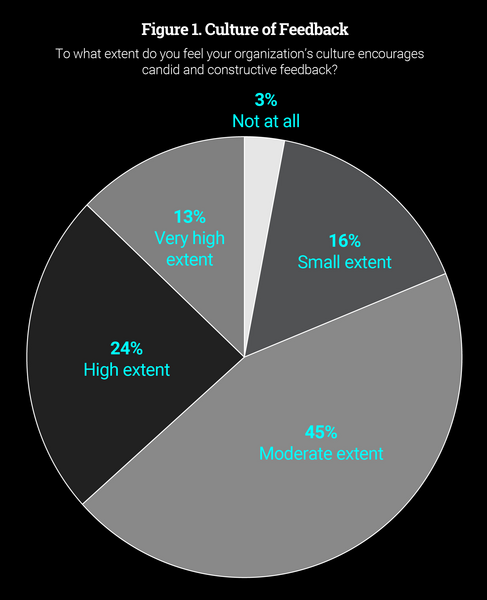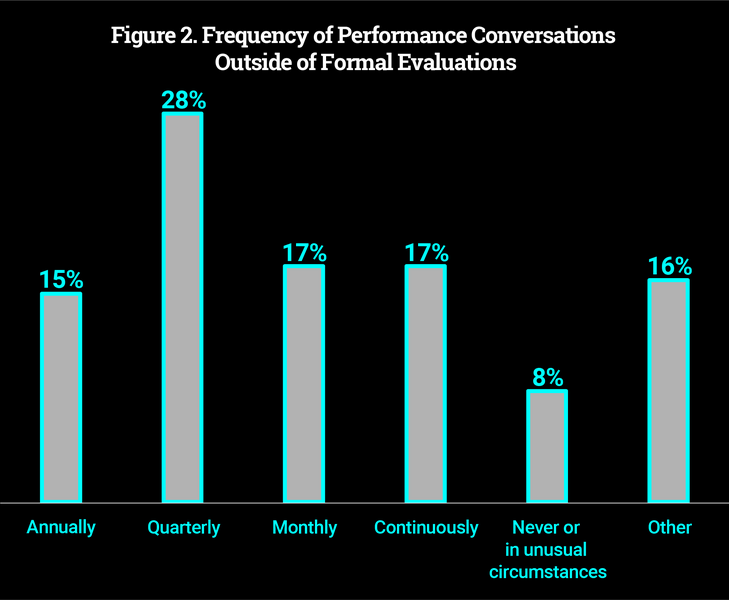CTDO Magazine Article
Let's Chat!
Content
While annual performance evaluations are the norm at most organizations, that doesn't mean giving and receiving feedback should happen only once a year.
While annual performance evaluations are the norm at most organizations, that doesn't mean giving and receiving feedback should happen only once a year.
Wed Apr 15 2020

Content
While annual performance evaluations are the norm at most organizations, that doesn't mean giving and receiving feedback should happen only once a year.
While annual performance evaluations are the norm at most organizations, that doesn't mean giving and receiving feedback should happen only once a year.
Content
The Association for Talent Development's forthcoming research report Performance Management: Driving Organizational and Personal Growth examines organizations' performance management processes, which may include practices such as setting goals and expectations for employees, giving employees feedback on their performance, and addressing performance outcomes. The report found that 60 percent of organizations conduct performance evaluations once yearly.
The Association for Talent Development's forthcoming research report Performance Management: Driving Organizational and Personal Growth examines organizations' performance management processes, which may include practices such as setting goals and expectations for employees, giving employees feedback on their performance, and addressing performance outcomes. The report found that 60 percent of organizations conduct performance evaluations once yearly.

Content
Source: Performance Management: Driving Organizational and Personal Growth, Association for Talent Development, 2020
Source: Performance Management: Driving Organizational and Personal Growth, Association for Talent Development, 2020
Content
But giving and receiving feedback, a crucial component for supporting and developing employees, should go beyond the annual performance evaluation. Just 37 percent of respondents said their organization's culture encourages candid and constructive feedback to a high or very high extent. The report found that top-performing organizations—those whose respondents indicated that their organization's performance management process was highly effective at every stage of the process—were significantly more likely to have a culture that encourages feedback.
But giving and receiving feedback, a crucial component for supporting and developing employees, should go beyond the annual performance evaluation. Just 37 percent of respondents said their organization's culture encourages candid and constructive feedback to a high or very high extent. The report found that top-performing organizations—those whose respondents indicated that their organization's performance management process was highly effective at every stage of the process—were significantly more likely to have a culture that encourages feedback.
Content
One way managers can encourage feedback is by having regular conversations with employees about their performance. At a majority of organizations (62 percent), managers and employees discuss the employee's performance progress quarterly or more frequently.
One way managers can encourage feedback is by having regular conversations with employees about their performance. At a majority of organizations (62 percent), managers and employees discuss the employee's performance progress quarterly or more frequently.
Content
Only 15 percent of respondents reported that performance conversations happen once a year. Analyses show that having performance conversations quarterly or more often is another practice significantly associated with top-performing organizations.
Only 15 percent of respondents reported that performance conversations happen once a year. Analyses show that having performance conversations quarterly or more often is another practice significantly associated with top-performing organizations.

Content
Source: Performance Management: Driving Organizational and Personal Growth, Association for Talent Development, 2020
Source: Performance Management: Driving Organizational and Personal Growth, Association for Talent Development, 2020
Content
Of course, having frequent performance conversations may be easier said than done. When asked about the biggest barriers to an effective performance management process, half of respondents (51 percent) said managers and employees struggled to find enough time to fully participate in the process. This may especially be the case in organizations where formal performance conversations must follow an established procedure that involves guidelines and documentation.
Of course, having frequent performance conversations may be easier said than done. When asked about the biggest barriers to an effective performance management process, half of respondents (51 percent) said managers and employees struggled to find enough time to fully participate in the process. This may especially be the case in organizations where formal performance conversations must follow an established procedure that involves guidelines and documentation.
Content
However, feedback doesn't need to be a formal, lengthy process. To ensure employees receive the feedback they need to perform their jobs well, managers should consider making short feedback conversations part of daily life.
However, feedback doesn't need to be a formal, lengthy process. To ensure employees receive the feedback they need to perform their jobs well, managers should consider making short feedback conversations part of daily life.
Content
"When managers say they don't have time for a discussion, I understand that they may not have time to sit in front of a computer and jot down responses on a form," says Mark Dunn, vice president of organization and leadership development at Vidant Health. "But we can help them understand that any time a manager is sitting with an employee, they have an opportunity to say, ‘Job well done,' ‘Here's how you could do this even better,' or ‘How can I support you?' Those three things are performance management. It's just about how we capture that along the way."
"When managers say they don't have time for a discussion, I understand that they may not have time to sit in front of a computer and jot down responses on a form," says Mark Dunn, vice president of organization and leadership development at Vidant Health. "But we can help them understand that any time a manager is sitting with an employee, they have an opportunity to say, ‘Job well done,' ‘Here's how you could do this even better,' or ‘How can I support you?' Those three things are performance management. It's just about how we capture that along the way."
Content
By turning brief interactions with employees into opportunities to give feedback, managers can help foster a culture of feedback that persists even after performance evaluations have been completed.
By turning brief interactions with employees into opportunities to give feedback, managers can help foster a culture of feedback that persists even after performance evaluations have been completed.
Content
Read more from CTDO magazine : Essential talent development content for C-suite leaders.
Read more from CTDO magazine: Essential talent development content for C-suite leaders.
